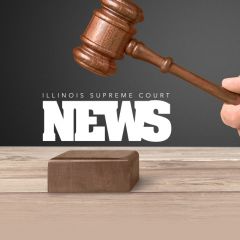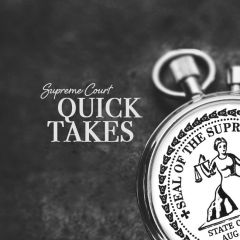Join us online from 9 a.m. until 4:30 p.m. on Friday, June 12 to learn about negotiation strategies for attorneys.
You negotiate every day. In fact, your ability to effectively negotiate may be the most critical skill you possess, yet most negotiate instinctively or intuitively. This Master Series seminar trains you to approach negotiations with a strategic mindset, allowing you to become a more effective lawyer. And make no mistake – no matter how much you’ve negotiated, you can still learn. Adding that one new tactic may be the difference between winning and walking away empty-handed. Topics include: the golden rules of negotiation; gaining leverage with alternatives; using objective criteria and timing to your advantage; techniques for gathering information; generating creative solutions; dealing with “negotiation games”; ethical considerations; and much more.
ISBA members, sign up to receive The Bar News' biweekly e-newsletter by emailing emailpreferences@isba.org
-
May 27, 2020 | CLE

-
May 26, 2020 | Practice News
 The Illinois Supreme Court announced today that on June 1, 2020 the Supreme Court Clerk’s Office will begin offering an option for attorneys to request a Certificate of Good Standing online through a link on the Supreme Court’s website. Attorneys shall make a request for a Certificate of Good Standing by filling out requested information and then paying the $15 fee electronically on the Illinois State Treasurer’s ePAY site, a full-service electronic payment program specifically designed for Illinois governments. Additional copies will cost $5 each.
The Illinois Supreme Court announced today that on June 1, 2020 the Supreme Court Clerk’s Office will begin offering an option for attorneys to request a Certificate of Good Standing online through a link on the Supreme Court’s website. Attorneys shall make a request for a Certificate of Good Standing by filling out requested information and then paying the $15 fee electronically on the Illinois State Treasurer’s ePAY site, a full-service electronic payment program specifically designed for Illinois governments. Additional copies will cost $5 each. -
May 26, 2020 | Practice News
 An underdiscussed but vitally important aspect of today’s criminal justice system is the ever-expanding role of assessments charged to convicted defendants in criminal cases. These fines and fees charged by states and municipalities aim to minimize the cost of criminal prosecutions on the taxpayers and deter future criminal activity. Nationally, convicted persons are charged an average of $13,607 for conviction-related costs, including restitution and attorney fees. As Benjamin Sardinas notes in his May Illinois Bar Journal artilcle, “The Ball Is in Your Court,” nearly half of convicted persons’ families who helped cover those costs say they could not afford such fees and 38 percent of those families found court fees and fines the most difficult among the costs of conviction. Since the passage of Illinois Supreme Court Rule 472, correcting errors in the calculation and imposition of court assessments have become part of the responsibilities of trial prosecutors and defense attorneys. Sardinas reviews the history of correcting errors in sentencing, the changing legal landscape in the wake of Rule 472, and suggests how criminal trial attorneys may challenge assessments and sentencing errors to prevent their incidence and prevalence.
An underdiscussed but vitally important aspect of today’s criminal justice system is the ever-expanding role of assessments charged to convicted defendants in criminal cases. These fines and fees charged by states and municipalities aim to minimize the cost of criminal prosecutions on the taxpayers and deter future criminal activity. Nationally, convicted persons are charged an average of $13,607 for conviction-related costs, including restitution and attorney fees. As Benjamin Sardinas notes in his May Illinois Bar Journal artilcle, “The Ball Is in Your Court,” nearly half of convicted persons’ families who helped cover those costs say they could not afford such fees and 38 percent of those families found court fees and fines the most difficult among the costs of conviction. Since the passage of Illinois Supreme Court Rule 472, correcting errors in the calculation and imposition of court assessments have become part of the responsibilities of trial prosecutors and defense attorneys. Sardinas reviews the history of correcting errors in sentencing, the changing legal landscape in the wake of Rule 472, and suggests how criminal trial attorneys may challenge assessments and sentencing errors to prevent their incidence and prevalence. -
May 26, 2020 | ISBA News
 Enter the ISBA’s Member Appreciation Month Twitter contest for your chance to win a $100 Visa gift card. In 280 characters or less, tell us what ISBA member benefits are particularly useful to you during the COVID-19 pandemic. Be sure to tag @ISBALawyer and use the hashtag #isbabenefits A winner will be chosen at random.
Enter the ISBA’s Member Appreciation Month Twitter contest for your chance to win a $100 Visa gift card. In 280 characters or less, tell us what ISBA member benefits are particularly useful to you during the COVID-19 pandemic. Be sure to tag @ISBALawyer and use the hashtag #isbabenefits A winner will be chosen at random. -
May 22, 2020 | Practice News
 Chief Justice Anne M. Burke and the Illinois Supreme Court announced today the repeal of Supreme Court Rule 185, creation of new Rule 45, and amendments to Rule 46 and Rule 241. These rules all relate to the use of remote hearings via telephone or video conferencing in the courts and the official recording of these court proceedings. The rule changes are effective immediately.
Chief Justice Anne M. Burke and the Illinois Supreme Court announced today the repeal of Supreme Court Rule 185, creation of new Rule 45, and amendments to Rule 46 and Rule 241. These rules all relate to the use of remote hearings via telephone or video conferencing in the courts and the official recording of these court proceedings. The rule changes are effective immediately. -
May 22, 2020 | Practice News
 The Illinois Supreme Court announced today a temporary order to harmonize the current procedure for eviction cases during the COVID-19 pandemic with new federal requirements recently adopted as part of the Coronavirus Aid, Relief, and Economic Security Act (CARES Act), which was passed by Congress and signed into law on March 27, 2020. The goal of this order is to ensure there are no inadvertent violations of the new federal law during the pandemic that would result in improper and unnecessary evictions at such a difficult time for residents of Illinois.
The Illinois Supreme Court announced today a temporary order to harmonize the current procedure for eviction cases during the COVID-19 pandemic with new federal requirements recently adopted as part of the Coronavirus Aid, Relief, and Economic Security Act (CARES Act), which was passed by Congress and signed into law on March 27, 2020. The goal of this order is to ensure there are no inadvertent violations of the new federal law during the pandemic that would result in improper and unnecessary evictions at such a difficult time for residents of Illinois. -
May 21, 2020 | Practice News
 The Illinois Supreme Court handed down three opinions on Thursday, May 21. In People v. Green, the court weighed in on conflict-of-interest issues when an attorney has represented an intended victim of a crime where another person turns out to be the actual victim. In Levin v. Retirement Board of the County Employees’ & Officers’ Annuity & Benefit Fund, the court upheld an appellate court decision that a county board exceeded its authority in denying an employee health insurance because she was previously a state employee. In Lewis v. Lead Industries Association, the court held that plaintiffs in a class action lawsuit to recover the costs of lead screening undergone by their children had no claim.
The Illinois Supreme Court handed down three opinions on Thursday, May 21. In People v. Green, the court weighed in on conflict-of-interest issues when an attorney has represented an intended victim of a crime where another person turns out to be the actual victim. In Levin v. Retirement Board of the County Employees’ & Officers’ Annuity & Benefit Fund, the court upheld an appellate court decision that a county board exceeded its authority in denying an employee health insurance because she was previously a state employee. In Lewis v. Lead Industries Association, the court held that plaintiffs in a class action lawsuit to recover the costs of lead screening undergone by their children had no claim. -
May 21, 2020 | CLE
 Join us online from 1 until 2 p.m. on Tuesday, June 9 to gain a better understanding of the function, process, and makeup of the Illinois Educational Labor Relations Board. Education law attorneys, general practitioners, and labor and employment lawyers with all levels of practice experience who attend this online seminar will learn: what information is needed when filing a petition; how to handle an unfair labor practice charge; and how to present other matters before the Illinois Education Labor Relations Board, including employee strikes.
Join us online from 1 until 2 p.m. on Tuesday, June 9 to gain a better understanding of the function, process, and makeup of the Illinois Educational Labor Relations Board. Education law attorneys, general practitioners, and labor and employment lawyers with all levels of practice experience who attend this online seminar will learn: what information is needed when filing a petition; how to handle an unfair labor practice charge; and how to present other matters before the Illinois Education Labor Relations Board, including employee strikes. -
May 20, 2020 |
ISBA News
In this Quick Takes for Your Practice video, attorney Jeffrey Dovitz discusses loan payment forbearance under the CARES Act.
-
May 20, 2020 |
ISBA News
In this Quick Takes for Your Practice video, attorney Anne Prenner Schmidt discusses retirement help under the CARES Act.1 comment (Most recent May 28, 2020)

